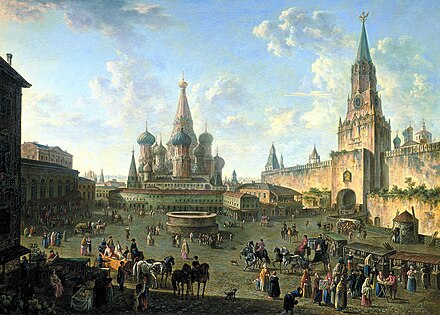JANUARY 30, 2025 – (Cont.) After covering the “three levels of learning,” Professor Stavrou turned to the study of history generally. He emphasized that before you can assess what you’re reading on the history of most anything, you need to know the historian. Who is writing? What’s their background, their perspective, their springboard, their biases and so on? Curiously, he was conspicuously modest about his own storied background. He did say that what led inevitably to his study of Russia was his interest in the history of Orthodox Christianity, the origins of which sprang from Byzantium. Later, Russia would see itself as the “third Rome” and heir of Byzantium, which centuries earlier had become the “second Rome” upon Diocletian’s splitting of the original Roman Empire (286 C.E.). (Having read The Icon and the Axe by James Hadley Billington and The Story of Russia by Orlando Eiges, I found the logic of Stavrou’s scholastic path to Russia compelling. By the referenced books, I realized what formative impact Orthodoxy had on the history of Russia—and continues to influence that country.)
Better than an hour into the class, we were led on a wide circle around the subject matter of the course—Russian history from Peter the Great (r. 1682 – 1725) to the present. We were introduced to the prime determinants of that history: geography, messianic religion, and serfdom.
Stavrou underscored the role of geography and referenced an astute observation of Alexis de Tocqueville in his famous work, Democracy in America, published in 1835, to the effect that while the United States was expanding westward to the Pacific Ocean, Russia was moving eastward past the Urals (which, Professor Stavrou noted, aren’t really mountains at all, but hills; not a formidable barrier, even though geologically they mark the boundary between Europe and Asia) across Siberia toward the opposite side of the Pacific. He predicted that these vast powers expanding in opposite directions would inevitably meet—and conflict. This natural conflict is bound to continue. Stavrou also touched on the contrast between Alfred Mahan’s theory of the source of imperial might—sea power—and the view that whoever controls the heartland, holds the ultimate power. In the case of Russia, the heartland is the region of Moscow and south to the Caucuses.
The messianic strain in Russian Orthodox Christianity is a force to be reckoned with by every student of Russian history. After the October Revolution (1917), of course, the church was stripped of its wealth and power and forced into internal exile. But it was hardly extinguished. Moreover, the notion that Moscow is the Third Rome runs strong in Russia today. For his self-aggrandizement, Putin has called the Orthodox church out of exile and given it grand encouragement.
To understand better the role of serfdom in Russian history, Stavrou recommended literature—specifically, The Pearl, a novel by Douglas Smith. In the professor’s enthusiastic recommendation of the book, I realized how in all my previous reading of Russian history and literature, I hadn’t fully appreciated the role that the institution of serfdom had played in shaping Russian culture and the Russian psyche. I can’t wait to plunge into this part of the Russian story, but with a much better perspective than ever before.
Using The Pearl as an example, Stavrou stressed the importance of Russian literature generally as a window into understanding Russia.
Matt and I found our appetites whetted by the promise of a syllabus and course bibliography to be distributed at our next class. Professor Stavrou said that not all the books, etc. would be required reading; that he would include lots of non-required sources that he thought we’d simply find interesting. As an undergraduate, I used to wince at the reading lists for my various history courses. On this occasion, I couldn’t wait to comb through what I hoped were several pages of sources. I wondered too how many of the books I’ve read (e.g. Robert Massie’s biographies of Peter, Catherine, and Nicholas and Alexandra; Suzanne Massie’s book, Land of the Firebird, a wonderfully accessible, fascinating and comprehensive book about Russian culture; the books referenced above; biographies of 19th century Tsars; books about the Russian Revolution; accounts of Russia’s experience in World War I and the Soviet Union’s tribulations during World War II)—and what Stavrou might think of the authors/scholars behind them.
Stavrou spoke briefly about tests and grades—for those who were engaged in the “first level of learning.” It was all very non-threatening. All the tests, including the final exam, will be “take-home.” Furthermore, “You will pass the course just by coming to class,” said Stavrou. “If it were otherwise,” he said with a twinkle in his eye, “would indicate that my lectures aren’t worth much.” He then told us that if anyone wished to take the final exam as an oral exam, he would be happy to accommodate, “because some people are simply more comfortable talking than they are writing.”
Although Matt and I are taking the course strictly as a “third level of learning” (for the pure joy of it), we probably won’t “burden” the good professor with the additional work of reading and grading our test essays. The invitation to sit for an oral final exam, however, was attractive, if for no other reason than it would provide a chance for one-on-one discussion with this great and learned scholar.
After class adjourned, Matt and I stepped outside and headed for the nearby parking ramp. Shining down on us were planets—Venus and Saturn—posing as stars of the very highest magnitude. Against a velvet backdrop, they appeared as gems of the rarest sort—much as this guy Theofanis Stavrou, who started out as a Greek Cypriot, found his way to the geographic center of North America and for over 60 years and still going strong, established himself as a star of the most extraordinary kind.
Subscribe to this blog and receive notifications of new posts by email.
© 2025 by Eric Nilsson

1 Comment
Wonerful story. Thanks, Eric.